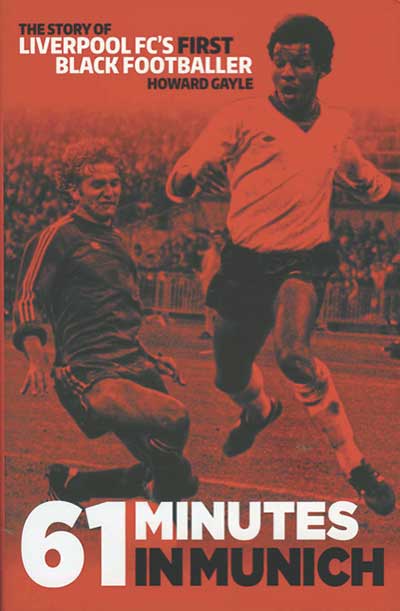
by Howard Gayle
deCoubertin, £16.99
Review by Rob Hughes
Buy this book
As you may have inferred from its title, 61 Minutes In Munich is an apt summation of Howard Gayle’s Liverpool career. He played just five times for the first team, most famously as a substitute for the injured Kenny Dalglish in a European Cup semi-final second-leg in 1981. It was a night that saw the 19-year-old terrorise the Bayern defence with his pace, though one that ultimately ended in humiliation when Bob Paisley brought him off after conceding a needless booking. A bittersweet end to what “should have been the greatest moment of my life”.
On one level, 61 Minutes In Munich is a familiar account of a player on the fringes, blessed with oodles of talent but ultimately undone by circumstance and bad fortune. Gayle is hit by the realisation that – having come through the same reserve side as Ian Rush, Ronnie Whelan and Sammy Lee – he has to leave the club to secure playing time. Cue spells at Birmingham, Sunderland, Stoke and Blackburn, before retiring at 33.
Yet the book also serves as a fascinating social document of post-war British life. In particular, as a black working-class kid growing up in Liverpool 8 and Norris Green, the bigotry and prejudice that Gayle encounters on a daily basis. Institutionalised racism is something he endures, without ever accepting it. He quickly develops a loathing of all authority and becomes a petty thief as a teenager. At one point he’s sentenced to four months’ prison for dealing stolen goods and, in the fracas, biting a policeman. There are disturbing revelations too, most notably when he describes being sexually assaulted by a sports teacher after class.
All of this personal history is woven into a wider portrait of societal decay in the 1970s, where traditional industries are systematically being shut down and English culture has begun to fragment. This feeds into the tribal frustrations of football hooliganism, of which Gayle and friends were a part. “I guess you could see it as self-harming in disguise,” he offers. Had Liverpool not signed him up, he’s convinced he would’ve fallen into serious crime.
The most vivid passages detail his time at Anfield. As the first black player to train at Melwood with the matchday squad and, in October 1980, to break into the first team, Gayle is subject to what’s contentiously referred to as “banter”. He’s keen to point out that no one was immune among the playing staff (it was intended to foster the “Teflon mentality” that was essential to Liverpool’s winning mindset), but often it became an excuse for racial slurs. Gayle’s recollection of a training ground bust-up with Tommy Smith, for example, will leave Reds fans with an altogether less palatable opinion of the legendary Anfield Iron.
Written in conjunction with author Simon Hughes, 61 Minutes In Munich is a candid diary in which Gayle admits his shortcomings and failures, but never wavers from his core principles. Honoured for his role as a campaigner for Show Racism The Red Card, he refused an MBE this summer, citing the award as a betrayal to all Africans who suffered from slavery in the cause of the British Empire. This essential book makes his case in emphatic fashion.